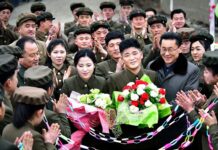After completing his tour of Russia, Kim Jong Il crossed the Yalu River from Jian into Manpo on Saturday evening, returning to North Korea 2 days and 3 nights entering China. The trip was unusual in that it was reported heavily both domestically in North Korea and to the outside world via Chosun Central News Agency (KCNA).
As he made his way back to Pyongyang, Kim went to some lengths to be seen taking charge of economic matters and spoke of his desire to return to the Six-Party Talks, presumably in an effort to maximize the fruits of his trip internally by restoring confidence in the system and strengthening internal solidarity.
In China, Kim toured the No 2 Machine Tool Group and the Mengniu Dairy Plant in Qiqihar, before heading to Daqing to review an exhibition of urban planning as well as residential construction sites.
As was widely reported, Kim had already visited Bureya, the site of the largest hydroelectric power plant in the Russian Far East, and displayed a keen interest in a three-way joint project to construct a gas pipeline to South Korea in summit talks with President Dmitry Medvedev.
The economic initiatives were reported promptly and in detail by KCNA. This certainly appears remarkable, given that Kim’s foreign ventures have traditionally gone unreported for fears over his personal safety.
Kim’s decision to publicize his trip therefore seems to have been an effort to prove that he is handling the economy and mitigate some of the displeasure aimed at the leadership regarding the bad economic situation.
Kim also met with members of China’s political elite, including State Councillor Dai Bingguo. He used that meeting to reaffirm his willingness to return to the Six-Party Talks unconditionally.
Following the meeting, both the North Korean and Chinese media were quick to claim that Kim had confirmed his desire to restart the Six-Party Talks and denuclearize the Korean Peninsula. In other words, the international community was being shown that first Russia and then China had no objection to restarting the Six-Party Talks.
The move was evidently designed to put pressure on the U.S., Japan and South Korea, which are demanding that certain preconditions be met before the talks can resume, primarily putting a stop to the manufacture and testing of nuclear weapons and missiles, and allowing the International Atomic Energy Agency (IAEA) back into the country to inspect North Korea’s Uranium Enrichment Program (UEP).
“By saying he will participate in the Six Party Talks without any prior conditions whatsoever, Kim Jong Il is showing his intention to force the governments of South Korea, the US and Japan back to the talks,” according to Park Young Ho of the Korean Institute for National Unification, who also noted, “North Korea is also hoping that another effect of this will be to convince the outside world that something is changing internally.”
The KCNA further reported that Kim Jong Eun welcomed his father home at the border, just as he did in May when Kim came back from his last visit to China. The younger Kim’s presence was a ploy to let the successor-in-waiting ride on the coattails of Kim’s visit to Russia and China, Park believes, saying it was “to propagandize the idea that Kim Jong Eun is working hard alongside his father to improve the livelihoods of the citizens of North Korea.”




















